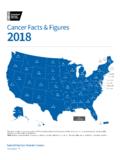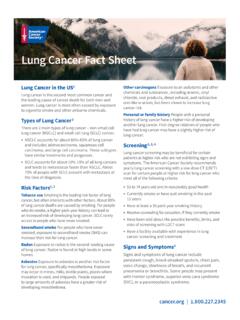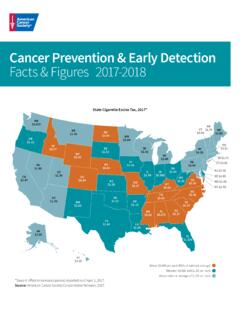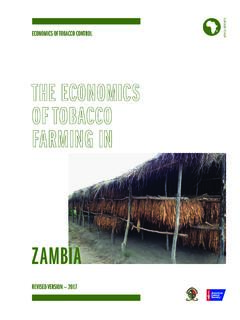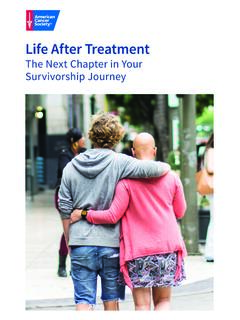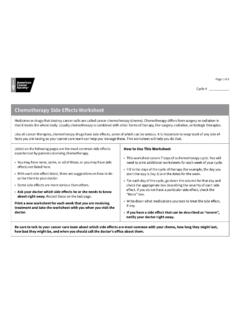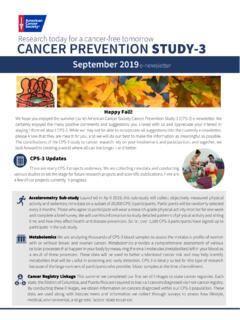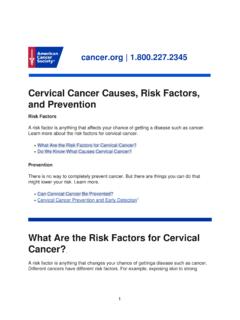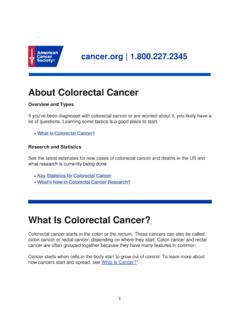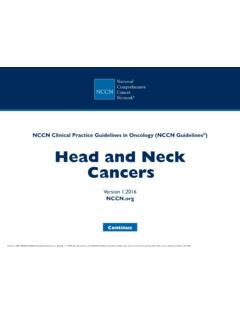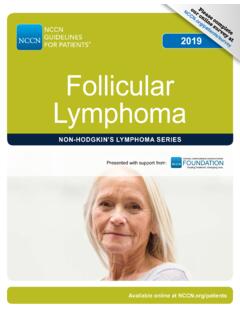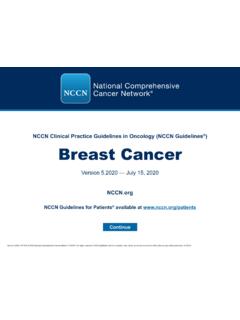Transcription of Colorectal Cancer Early Detection, Diagnosis, and Staging
1 Colorectal Cancer Early Detection, diagnosis , and Staging | and DiagnosisFinding Cancer Early , when it's small and hasn't spread, often allows for more treatmentoptions. Some Early cancers may have signs and symptoms that can be noticed, butthat's not always the Colorectal Polyps and Cancer Be Found Early ?lAmerican Cancer Society Guideline for Colorectal Cancer ScreeninglColorectal Cancer Screening TestslInsurance Coverage for Colorectal Cancer ScreeninglColorectal Cancer Signs and SymptomslTests to Diagnose and Stage Colorectal CancerlUnderstanding Your Pathology ReportlStages and Outlook (Prognosis)After a Cancer diagnosis , Staging provides important information about the extent ofcancer in the body and anticipated response to Cancer StageslSurvival Rates for Colorectal CancerlQuestions to Ask About Colorectal CancerHere are some questions you can ask your Cancer care team to help you betterunderstand your Cancer diagnosis and treatment Cancer | to Ask About Colorectal CancerlCan Colorectal Polyps and Cancer BeFound Early ?
2 Screening is the process of looking for Cancer or pre- Cancer in people who have nosymptoms of the disease. Regular Colorectal Cancer screening is one of the mostpowerful tools against Colorectal Cancer . Screening can often find Colorectal Cancer Early , when it's small, hasn't spread, andmight be easier to treat. Regular screening can even prevent Colorectal Cancer . Apolyp can take as many as 10 to 15 years to develop into Cancer . With screening,doctors can find and remove polyps before they have the chance to turn into is Colorectal Cancer screening important? Colorectal Cancer is a leading cause of Cancer death for both men and women in theUS. But the death rate1 (the number of deaths per 100,000 people per year) ofcolorectal Cancer has been dropping for several decades. One reason for this is thatcolorectal polyps are now more often found by screening and removed before they candevelop into Colorectal Cancer is found at an Early stage before it has spread, the 5-yearrelative survival rate is about 90%.
3 But only about 4 out of 10 Colorectal cancers arefound at this Early stage. When Cancer has spread outside the colon or rectum, survivalrates are , about 1 in 3 people in the US who should get tested for Colorectal cancerhave never been screened. This may be because they don't know that regular testingcould save their lives from this disease, or due to things like cost and health insurancecoverage Colorectal Cancer Screening Tests for more on the tests used to screen forcolorectal Cancer . American Cancer Society Recommendations for Colorectal CancerEarly detection has our guidelines for using these tests to find Colorectal Cancer and2 American Cancer | Cancer Society. Cancer Facts & Figures 2020. Atlanta, American CancerSociety; Cancer Society. Colorectal Cancer Facts & Figures 2020-2022. Atlanta,American Cancer Society; N, Noone AM, Krapcho M, Miller D, Brest A, Yu M, Ruhl J, Tatalovich Z,Mariotto A, Lewis DR, Chen HS, Feuer EJ, Cronin KA (eds).
4 SEER Cancer StatisticsReview, 1975-2016, National Cancer Institute. Bethesda, MD, , based on November 2018 SEER datasubmission, posted to the SEER web site, April Revised: June 29, 2020 American Cancer Society Guideline forColorectal Cancer Screening For people at average riskThe COVID-19 pandemic has resulted in many elective procedures being put onhold, and this has led to a substantial decline in Cancer screening. Health carefacilities are providing Cancer screening during the pandemic with many safetyprecautions in place. Learn how you can talk to your doctor and what steps youcan take to plan, schedule, and get your regular Cancer screenings in CancerScreening During the COVID-19 Cancer | ACS recommends that people at average risk* of Colorectal Cancer start regularscreening at age 45. This can be done either with a sensitive test that looks for signs ofcancer in a person s stool (a stool-based test), or with an exam that looks at the colonand rectum (a visual exam).
5 These options are listed who are in good health and with a life expectancy of more than 10 years shouldcontinue regular Colorectal Cancer screening through the age of people ages 76 through 85, the decision to be screened should be based on aperson s preferences, life expectancy, overall health, and prior screening over 85 should no longer get Colorectal Cancer screening.*For screening, people are considered to be at average risk if they do not have:A personal history of Colorectal Cancer or certain types of polypslA family history of Colorectal cancerlA personal history of inflammatory bowel disease (ulcerative colitis or Crohn sdisease)lA confirmed or suspected hereditary Colorectal Cancer syndrome, such as familialadenomatous polyposis (FAP) or Lynch syndrome (hereditary non-polyposis coloncancer or HNPCC)lA personal history of getting radiation to the abdomen (belly) or pelvic area to treata prior cancerlTest options for Colorectal Cancer screeningSeveral test options are available for Colorectal Cancer screening.
6 Stool-based testsHighly sensitive fecal immunochemical test (FIT) every yearlHighly sensitive guaiac-based fecal occult blood test (gFOBT) every yearlMulti-targeted stool DNA test (mt-sDNA) every 3 yearslVisual (structural) exams of the colon and rectum4 American Cancer | every 10 yearslCT colonography (virtual colonoscopy) every 5 yearslFlexible sigmoidoscopy (FSIG) every 5 yearslThere are some differences between these tests to consider (see Colorectal CancerScreening Tests), but the most important thing is to get screened, no matter whichtest you choose. Talk to your health care provider about which tests might be goodoptions for you, and to your insurance provider about your a person chooses to be screened with a test other than colonoscopy, anyabnormal test result should be followed up with a timely people at increased or high riskPeople at increased or high risk of Colorectal Cancer might need to start colorectalcancer screening before age 45, be screened more often, and/or get specific tests.
7 Thisincludes people with:A strong family history of Colorectal Cancer or certain types of polyps(see Colorectal Cancer Risk Factors2)lA personal history of Colorectal Cancer or certain types of polypslA personal history of inflammatory bowel disease (ulcerative colitis or Crohn sdisease)lA known family history of a hereditary Colorectal Cancer syndrome such as familialadenomatous polyposis (FAP) or Lynch syndrome (also known as hereditary non-polyposis colon Cancer or HNPCC)lA personal history of radiation to the abdomen (belly) or pelvic area to treat a priorcancerlThe American Cancer Society does not have screening guidelines specifically forpeople at increased or high risk of Colorectal Cancer . However, some otherprofessional medical organizations, such as the US Multi-Society Task Force onColorectal Cancer (USMSTF), do put out such guidelines.
8 These guidelines arecomplex and are best looked at along with your health care provider. In general, theseguidelines put people into several groups (although the details depend on each person sspecific risk factors).People at increased risk for Colorectal cancer5 American Cancer | with one or more family members who have had colon or rectal cancerScreening recommendations for these people depend on who in the family had cancerand how old they were when it was diagnosed. Some people with a family history will beable to follow the recommendations for average risk adults, but others might need to geta colonoscopy (and not any other type of test) more often, and possibly starting beforeage who have had certain types of polyps removed during a colonoscopyMost of these people will need to get a colonoscopy again after 3 years, but somepeople might need to get one earlier (or later) than 3 years, depending on the type, size,and number of who have had colon or rectal cancerMost of these people will need to start having colonoscopies regularly about one yearafter surgery to remove the Cancer .
9 Other procedures like MRI or proctoscopy withultrasound might also be recommended for some people with rectal Cancer , dependingon the type of surgery they who have had radiation to the abdomen (belly) or pelvic area to treat aprior cancerMost of these people will need to start having Colorectal screening (colonoscopy or stoolbased testing) at an earlier age (depending on how old they were when they got theradiation). Screening often begins 5 years after the radiation was given or at age 30,whichever comes last. These people might also need to be screened more often thannormal (such as at least every 3 to 5 years).People at high risk for Colorectal cancerPeople with inflammatory bowel disease (Crohn s disease or ulcerative colitis)These people generally need to get colonoscopies (not any other type of test) starting atleast 8 years after they are diagnosed with inflammatory bowel disease.
10 Follow-upcolonoscopies should be done every 1 to 3 years, depending on the person s riskfactors for Colorectal Cancer and the findings on the previous known or suspected to have certain genetic syndromes6 American Cancer | people generally need to have colonoscopy (not any of the other tests).Screening is often recommended to begin at a young age, possibly as Early as theteenage years for some syndromes and needs to be done much more depend on which genetic syndrome you have, and other you re at increased or high risk of Colorectal Cancer (or think you might be), talk toyour health care provider to learn more. Your provider can suggest the best screeningoption for you, as well as determine what type of screening schedule you should follow,based on your individual s Oncology Group. Long-Term Follow-Up Guidelines for Survivors ofChildhood, Adolescent, and Young Adult Cancer .
